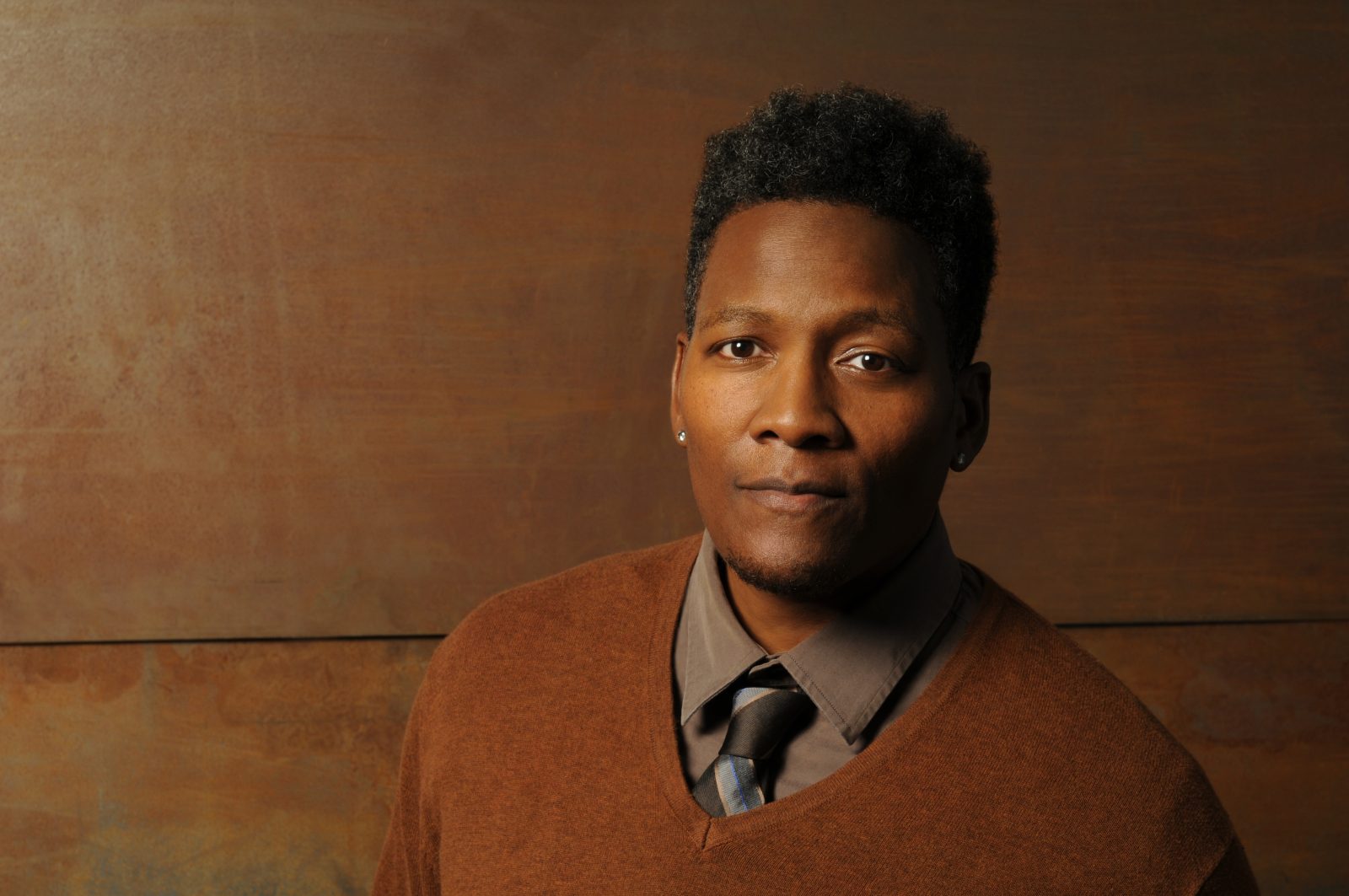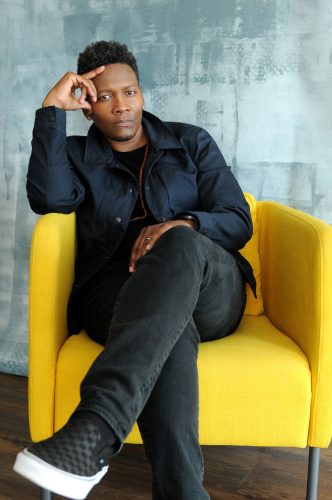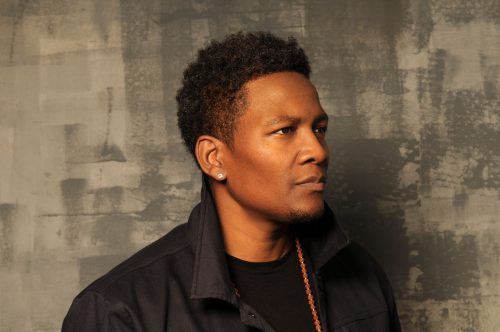
]Lee Robinson (he/him, they/them) came of age well aware he was cut from a different cloth. “I grew up in a small town in Kentucky and I knew as a young person that I was different. I didn’t really know what I was, but I knew that I was different. I knew that I wasn’t like my sisters. My body was the same, but I didn’t feel that way on the inside. We were a religious family. It was challenging because of the different identities – being Black and being queer in a small town in Kentucky. The work that I do as an actor and the visibility is so important. I’ve been reflecting on growing up and what it was like with religion and being a person of color and being queer,” they reflect. Lee has found a way to celebrate their multiplicity of identities on screen and use their roles to generate necessary dialogues. “I think about my art and I always bring up this role that I had an opportunity to play recently in Lena Waithe’s Twenties. I played the character Reverend Ty Harmon, and it was a reverend who was non-binary in the Black church. And the reverend’s job was to address some things around identity through marriage counseling for two of the major characters. The thing that happened that was so powerful was that there were all of these conversations that were happening in Black and brown communities about me as a non-binary character and actor portraying this reverend in the black church. There were so many people saying, ‘Wow, this is important. We don’t see this enough. It’s important to see this more.’ I even had my own family members like distant aunts and uncles saying that they saw the episode and it was really important and they wanted to talk about it a little bit more. To be able to play that role in such a great show was amazing.”
He feels honored to use his work to spotlight the often forgotten truth that trans and non-binary people have always been here. This reminder is more urgent than ever given the constant escalation of violence against Black trans women in particular. “It’s nothing new that we’ve been in the world for a very long time. This idea of normalizing and raising awareness is so important. My experience in Black and brown communities is being trans and non-binary, there’s an erasure of that. It’s like you don’t exist and you shouldn’t exist. I was speaking earlier today about the violence against specifically trans Black women and trans women of color. Hopefully some of these conversations we’re having in a very public way can encourage folks to have dialogue with themselves and each other around the values and how the violence is devastating to the community. How can we be more aware and protect each other and protect people? How can we lean into that conversation a little bit more and change minds, change hearts, change what’s happening in the world, you know?”
 Though society must grapple with this reality, Lee is eager to spotlight queer and trans joy. Playing Bertie Hart in A League of Their Own has allowed them to do just that. “Something about A League of Their Own that’s really, really powerful is that there are challenges, right? We’re talking about identity and within most identities there’s challenges, there’s hardship, there’s trauma. There are all of these things that can be challenging and that can be hard when we’re talking about specific identities. How personally I move through the world can be really hard. It can be challenging. There can be a lot of hardship. But there’s also joy. And I want to make sure that I talk about the joy as much as I talk about the other stuff. That’s something that’s really cool about being a part of A League of Their Own is that the show is tackling some topics that maybe weren’t tackled before. That’s always been the goal from the moment I sat down and had some conversations with writers. We also wanna talk about joy. We also wanna show these moments of joy that are happening. I think it’s really important to also highlight the joy and happiness, the beautiful things that also happen in our lives because we can exist in both of those places.”
Though society must grapple with this reality, Lee is eager to spotlight queer and trans joy. Playing Bertie Hart in A League of Their Own has allowed them to do just that. “Something about A League of Their Own that’s really, really powerful is that there are challenges, right? We’re talking about identity and within most identities there’s challenges, there’s hardship, there’s trauma. There are all of these things that can be challenging and that can be hard when we’re talking about specific identities. How personally I move through the world can be really hard. It can be challenging. There can be a lot of hardship. But there’s also joy. And I want to make sure that I talk about the joy as much as I talk about the other stuff. That’s something that’s really cool about being a part of A League of Their Own is that the show is tackling some topics that maybe weren’t tackled before. That’s always been the goal from the moment I sat down and had some conversations with writers. We also wanna talk about joy. We also wanna show these moments of joy that are happening. I think it’s really important to also highlight the joy and happiness, the beautiful things that also happen in our lives because we can exist in both of those places.”
Lee hopes the character provides a more in-depth rumination on identity than its beloved predecessor. “Bertie gives us an opportunity to look a little bit deeper into some of the lives that we didn’t get a chance to take a look at. There were things that were happening around race, around gender, sexuality, gender identity, and expression that maybe couldn’t be talked about at the time when the original came out. So with this piece, it gives us an opportunity to go deep into some of those things and really look at what are some of the challenges that were happening. What were some of those other lives like? What are some of the joys that we’re talking about right now? What’s been so incredibly cool and powerful about being a part of this project is that we get to extend the classic, which is amazing in so many ways. There are voices that aren’t being represented and experiences that aren’t being represented and we get to represent those a little bit more.” Perhaps Bertie is a way to honor the legacy of our trans and non-binary forebearers, many of whom existed and persisted before such labels were available. “I don’t see Bertie as a trans man because we didn’t have that language back then. I see myself in this world right now as a transgender non-binary person, but when I stepped into the role of Bertie, we didn’t have that language at that time. So folks will have to say tune to see who Bertie actually is. But I think that Bertie navigates this world from a place of just being, trying, trying really hard to be who they are. Walking in their shoes, walking in their experiences, having courage, navigating a lot of intersections of identity like race and all those ways that Bertie was existing. I think that Bertie is navigating those things with caution, with joy, and just standing in Bertie’s shoes. I can relate to that in my own life. I hope that a lot of people can relate to that in that way of existing and being who you are in the world and walking in your shoes and navigating the hard times and the good times and bringing joy into people’s lives and community and staying connected and building that community. Bertie navigates all of that with a lot of courage and joy and compassion.”
 Bertie – and their loving support system – is a testament to the power of chosen family, which resonates strongly with Lee’s own experiences. “I was a student athlete and my team was everything. There were a few of us that were queer and we had our own little closeted group. I will say that about like the team in A League of Their Own and I hope that the audience or folks who watch this can see this team becoming each other’s family and becoming each other’s chosen families. There’s a lot that’s happening in the world around these teammates, whether it’s their sexuality, their families, or expectations of them as women in the world and being on this team, there’s a lot of ways in which this team is an example of how you find your tribe, you find your team, you find your people, your chosen family, and you take care of each other.I would say that probably a lot of folks on the team and within the other communities that we’re looking at (like the Black communities) are finding their people. They’re finding the folks that they can support and that can support them. That’s definitely a huge part of a lot of different experiences with this piece.”
Bertie – and their loving support system – is a testament to the power of chosen family, which resonates strongly with Lee’s own experiences. “I was a student athlete and my team was everything. There were a few of us that were queer and we had our own little closeted group. I will say that about like the team in A League of Their Own and I hope that the audience or folks who watch this can see this team becoming each other’s family and becoming each other’s chosen families. There’s a lot that’s happening in the world around these teammates, whether it’s their sexuality, their families, or expectations of them as women in the world and being on this team, there’s a lot of ways in which this team is an example of how you find your tribe, you find your team, you find your people, your chosen family, and you take care of each other.I would say that probably a lot of folks on the team and within the other communities that we’re looking at (like the Black communities) are finding their people. They’re finding the folks that they can support and that can support them. That’s definitely a huge part of a lot of different experiences with this piece.”
The reality for trans and non-binary artists in the industry is still a work in progress. “I think education is important. I know when I’m on a set and my pronouns are honored, that feels really good to me, that’s validating. When they aren’t honored, that doesn’t feel so good. You’re there as an actor, I’m in character, then that happens. When you throw that in there, it’s jarring. But I’ve also been on sets (this one included) that pronouns are on point and folks are working to use the pronoun you asked them to use. They’re being curious and they’re creating that environment. The last couple of sets I’ve been on – A League of Their Own and Twenties – actually were very validating and accepting and welcoming and supportive and diverse. I wish every set could be that way. I know that they all aren’t that way, but I appreciate that.” We need to do everything we can to uplift gender non-conforming artists in media. “Let’s continue to create work that’s authentic and diverse, with different types of queer and trans and non-binary experiences. We need more visibility on screen, more visibility on sets, more visibility on crews, just diversifying as much as possible.”
Lee dreams of Bertie’s impact extending far beyond the screen.“One thing I keep telling everyone, my family, my friends, is I really hope that people have a conversation. I hope that they see Bertie in all these different family homes and whatever the environment is that you are watching this show in. I hope that it creates an opportunity for dialogue, whether it’s Bertie, whether it’s Max, or whoever’s experience that you resonate with. I hope that you have a conversation about it. That’s probably the biggest hope for me is that folks talk about this show, talk about the things that they’re seeing, and maybe talk about the fact that they haven’t seen that before. And maybe say, ‘Let’s talk about that. Wow. What do you think?’ and just have a whole conversation.” We have full confidence that Bertie will be a catalyst for enlightenment, especially when elevated by Lee’s performance. Much like the groundbreaking character they play, Lee is truly in a league of their own.
Read more Celebrity Interviews on ClicheMag.com
Lee Robinson Illuminates Historical Black Queer Experiences in “A League of Their Own.” Photo Credit: Lisa Keating.
The post Lee Robinson Illuminates Historical Black Queer Experiences in “A League of Their Own” appeared first on Digital Online Fashion Magazine | Free Fashion Magazine | Best Lifestyle Blog.
0 Commentaires